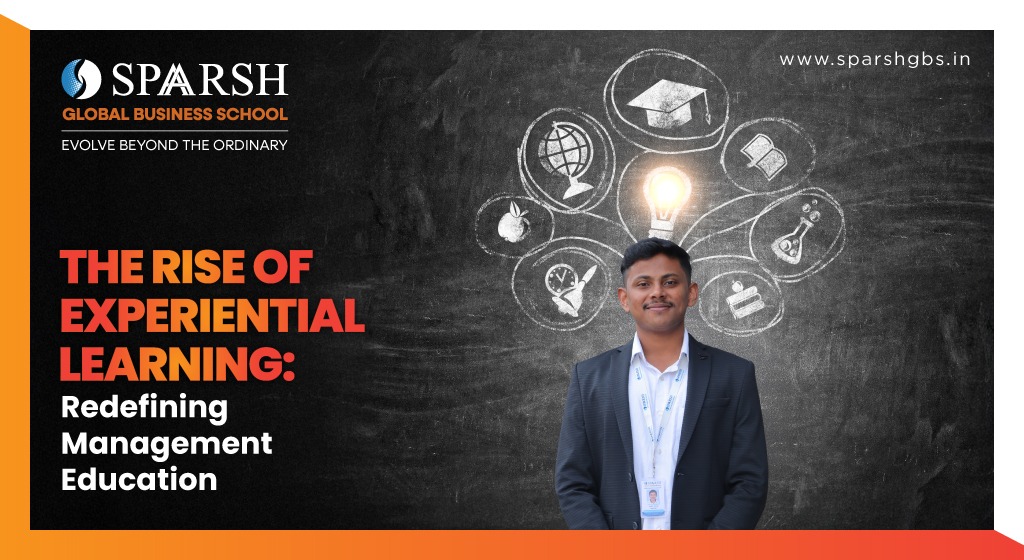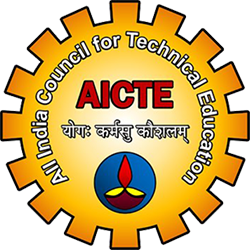Management education has undergone a significant transformation during the last few decades. The method of traditional lectures that ruled business school education now has undergone a paradigm shift. Business school students now receive increasing levels of experiential learning. Business management education needs constant adaptation on the basis of rapid changes in the landscape of business. It requires mentoring to teach leaders capabilities that create success. Sparsh Global Business School leads the initiative to transform education through experiential learning methods, which respond effectively to contemporary learning needs.

What is Experiential Learning?
The concept of "learning by doing" forms the basis of experiential learning. Students participate in activities that mimic real job situations. The teaching method focuses on student participation through applied learning activities, critical thinking and reflection elements. Students use case studies along with live projects, internships and simulated experiences to embark on entrepreneurial initiatives in order to connect academic knowledge with real-world application.
The Drivers Behind the Shift
Experiential learning has gained prominence due to the quick transformations in the business environment. Modern business demands managers with the skills to travel through uncertain situations and innovate at each step while providing effective leadership for their diverse teams. Traditional classroom approaches teach basic concepts well, yet fail to develop needed student competencies. Experiential learning takes an all-inclusive approach to developing complex skills and vital soft skills, including leadership capabilities, teamwork aptitudes, effective communication and adaptability skills.
How Business Schools Are Responding
Worldwide, educational institutions that train business students now appreciate that their purpose depends on integrating experiential learning practices into their academic standards. The educational transformation is demonstrated through increased attention to internships, consulting projects, simulations and entrepreneurship incubator programmes. Students receive support to face challenges beyond comfort limits while addressing genuine business issues through active experience and productive learning from accomplishments and setbacks. Students learn meaningful lessons while reflecting on their experiences because mentorship helps them integrate these lessons into their understanding.
SGBS - Leading the Change
At SGBS, experiential learning is embedded throughout the programme curriculum, recognising that future leaders need more than just theoretical education. The students at SGBS receive access to diverse initiatives that develop their practical skills at business. The curriculum at the institution embraces expertly designed experiences that start with industry projects and extend to leadership training workshops.
Building Industry Connections and Real-World Experience
SGBS develops strong alliances with leading corporates, start-ups and social enterprises that offer students deep insights into the business world. Through guest lectures, mentorship programmes and collaborative research initiatives, students develop real-world insights by getting exposure to professional challenges while pursuing their programme. These initiatives develop students for professional careers and simultaneously teach them how to bring innovative and adaptive approaches to business creation.
Developing Critical Skills for Future Leaders
The learning process through experience enhances critical thinking significantly while developing problem-solving capacities substantially. Managers in today's unpredictable business world must analyse complex business situations to create strategic decisions, followed by tactical methodological changes in their approach. By experiencing these hands-on learnings, students develop their ability to make fast decisions while simultaneously assessing different points of view until they reach decisions. Education through experiential learning promotes ethical discernment because scenarios require students to evaluate how their actions affect stakeholders and society.
Fostering Ownership and Personal Growth
Additionally, experiential learning fosters a sense of ownership and accountability among students. Students can link the results of their projects and internships directly to their investment. The responsibility students develop becomes a strong motivation, which triggers personal growth and increased engagement. The development of leadership success depends on the ability to face challenges, welcome criticism and the habit of unending pursuit of growth.
Conclusion: A New Era for Management Education
Experiential learning represents a transformative movement which changes the fundamental approach to teaching management education. The evolution of industry interactions brings in real-world business insights. The educational institutions that follow this produce future leaders who make meaningful contributions to their organisations.
Industrial education is fundamentally transformed as it delivers essential expertise and innovative ways of thinking, combined with practical experiences for professional success in complex business environments. Sparsh Global Business School leads the way in this transformative movement by delivering immersive education programmes that enable students to adapt well in the changing business landscape. SGBS produces graduates who can lead future businesses through their founding principle of blending real business practice with reflective educational experiences.
FAQ
- Why is experiential learning meaningful in modern management education?
Experiential learning is vital in modern management education because it bridges the gap between theoretical knowledge and real-world application. It helps students develop critical soft skills such as leadership, communication, problem-solving and adaptability—essential in today’s dynamic business environment. By engaging directly with real-world challenges through projects, internships and simulations, students gain practical experience and learn to think strategically, make informed decisions and confidently lead.



